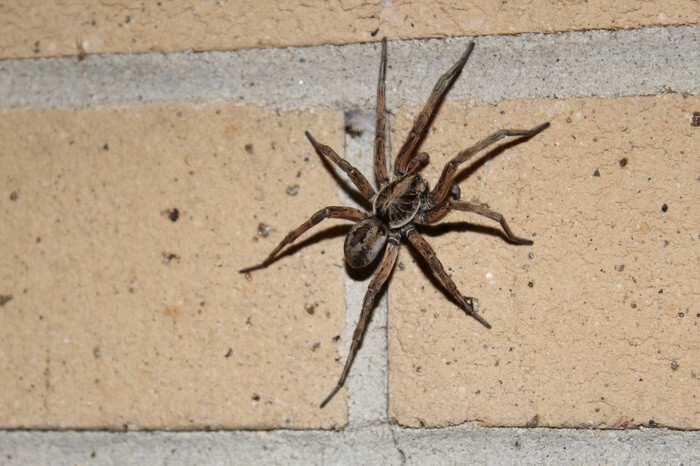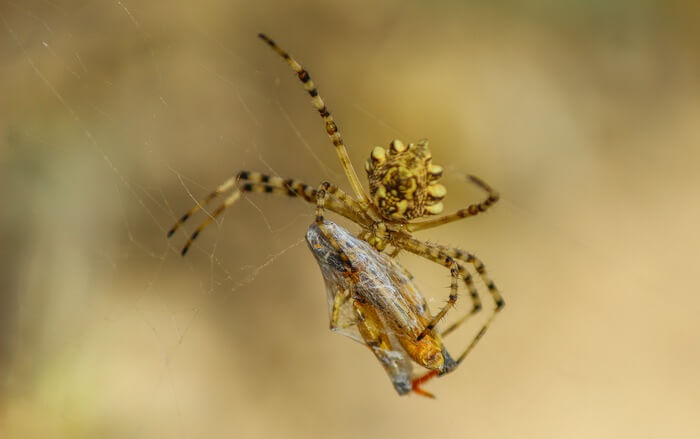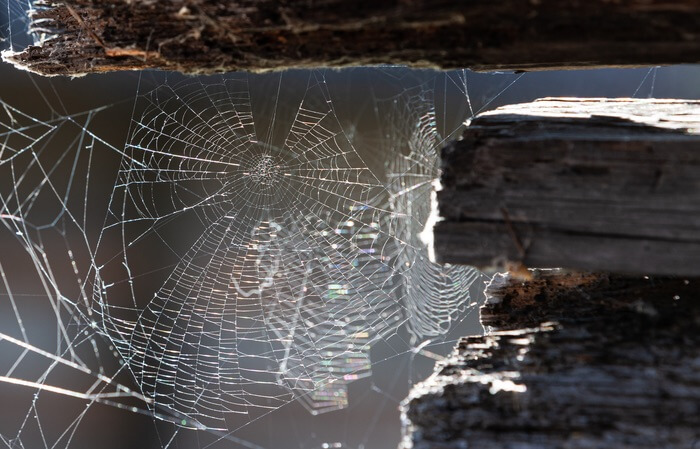For many homeowners, knowing how to get rid of spiders in your garage is very important. Most people don’t like the idea of these eight-legged critters lurking in the shadows!
This guide will teach you how to get rid of spiders in your garage, and how to keep them out. Trust us, it’s easier than it seems!
Table of contents
Why Do Spiders End Up In Garages?
Your garage may be nothing more than a place to store your car and boxes of junk. But to a spider, it’s a haven with all the things they need to live comfortably!
These critters love dark spaces that humans don’t frequent. Chances are, you don’t venture into your garage all that often unless you’re coming home or leaving. The lack of disturbance makes it easy for spiders to set up shop.
Plus, the general absence of light lets spiders roam free. Most household spider species are nocturnal or have some form of light sensitivity. Your dark and dingy garage is the perfect place to find shelter from the light and harsh weather conditions.

On top of all that, your garage attracts insects. Take a look around, and you might find everything from roaches to flies calling your garage home. Those bugs enter your domain for the very same reasons as the spider: It’s dark and provides plenty of shelter from the elements.
However, spiders have the added benefit of an ongoing food supply. Why venture back out into the wild when they can simply catch food in the comforts of your garage?
Your garage might as well be a paradise for these eight-legged creatures, so it’s not uncommon for homeowners to experience infestations at some point.
How To Get Rid Of Spiders In Your Garage
Regardless of why they decide to enter the space, getting rid of spiders in your garage is paramount! It doesn’t take long for a lone arachnid to lay eggs and create a thriving colony. Before you know it, they’ll end up invading the rest of your home and wreaking havoc on your family!
Fortunately, there are many ways to get rid of spiders in your garage. Here are some of the best methods to try out.
1. Use Spider Repellent
There’s no shortage of chemical-based spider repellents out there. Most of the commercial products you’ll find utilize a blend of chemical compounds that are capable of killing spiders on contact. Usually, they attack the nervous system or compromise the spider’s delicate exoskeleton.
Typically, catching spiders in the act of scurrying across your garage is rare. So, you must use chemical-based repellents to keep spiders out of your garage instead. The chemical compounds do double-duty as a scent-based deterrent.
The smell isn’t too much of an issue for us humans, but it’s offensive and unbearable to spiders. Spraying the repellent solution across potential access points can drive the spiders away and keep them out for good!
Spray the repellent on the floors, walls, and around windows. Pay special attention to the garage door opening or any visible cracks.
Quick Tip: Make sure to reapply according to the repellent’s instructions. These chemicals will dissipate with time, so you must reapply to maintain efficiency.
2. Seal Up The Garage
Spiders don’t need much leeway to get into a tight spot. While they look big due to the spread of their eight legs, most species have flexible bodies that can squirm through the tightest of cracks.
To keep spiders out of your garage, you’ll need to seal it up tight!
Garages are notorious for being poorly insulated. Thanks to all those small cracks and openings, everything from insects to rainwater can come in. That’s why most homes have a secondary external door separating the garage and the main living area.
Take some time to seal every little opening you can find. Once again, spend most of your attention on the garage door. It’s the biggest opening in the garage and is responsible for letting tons of bugs in.
Quick Tip: Invest in some rubber weather stripping. It goes on the bottom and sides of the garage door to create a tight seal when closed.
After that, look around the foundation, doors, and windows. You can use caulking or plaster to fix most problems. If there are air vents you cannot seal, consider using ultra-fine mesh to keep the spiders out.
3. Turn Off The Lights At Night
We know what you’re thinking, spiders hate the light, so why keep them off?
Well, light attracts insects. Have you ever noticed how your porch light acts as a magnet for flies, mosquitos, and other annoying pests? If you keep the lights on in the garage, they’ll have the same effect.
The lights will only bring more insects in, which gives the spider even more food resources to survive.
Keep the lights off all night long. Avoid doing any work after hours. Even something as simple as a portable lamp will draw those bugs in.
Quick Tip: It would help if you also keep outside lights off to be on the safe side. If you want to get rid of spiders in your garage, you need to stop leaving out a welcome sign for their food!
4. Remove Their Source Of Food
Keeping the lights off at night will do a lot when it comes to keeping spiders out of your garage. However, nighttime lights aren’t the only reason why pests gravitate toward this area. As we mentioned earlier, many insects venture into the space looking for shelter and food just like spiders.
One of the best ways to get rid of spiders in your garage is to remove their food source. That means making your garage pest-free!

Now, that may seem like a pretty tall order, but you’ll quickly find that being proactive about pest problems will result in a noticeable decline in spiders and other predatory bugs. Without food to survive, they have no choice but to move along.
You can start out by using chemical-based insecticides or bug bombs. Just be careful and exercise caution when using them. Read all instructions and make sure to air out the room before you let kids and pets come inside.
Beyond chemicals, you can also use poisoned bait traps, glue traps, and a wide assortment of extermination tools. Plan your efforts around the types of spiders you’re trying to get rid of. Targeted extermination plans tend to be more successful than broad ones.
5. Keep It Dry
In addition to food, spiders need water to survive. While arachnids get a lot of their hydration through the insects they eat, they also need to drink water.
Outside of the garage, their water sources might be droplets of morning dew on their webs or moisture on the ground from recent rainfall.
In your garage, none of that exists. That means they’re getting water from a specific source. There could be a leaking pipe somewhere you don’t even realize.
If you live in a humid environment, condensation might be a factor as well.
Perform a full inspection and find any source of water spiders could use to survive. Address leaking pipes and invest in a dehumidifier. Also, don’t forget to wipe up any spills or water your vehicle trails in during rain. Keeping things dry will go a long way when it comes to preventing spiders from getting into your garage!
6. Get Some Peppermint Oil
Using peppermint oil to repel spiders is a fantastic option.
It has similar effects to the chemical stuff. But, you don’t have to worry about the potential dangers of having harmful chemicals in your home.
Peppermint is an aromatic herb. While pleasant to us, it drives spiders and many insects crazy. You can use that to your advantage to not only keep spiders out of your garage, but their food as well!
To create a peppermint oil solution, mix about two cups of water with five drops of essential oils. Then, add about five drops of dish soap (the soap will help with the spread).
Give the bottle a good shape and spray it liberally throughout the garage. Use it to treat corners, floors, walls, and entryways.
Quick Tip: Like chemical repellents, you’ll need to reapply the solution regularly.
7. Do Some General Cleaning
Many homeowners use their garage as additional storage space. While there’s nothing inherently wrong with that, clutter can make the area more inviting to spiders.
Old boxes of junk are quick and easy hiding places for these critters. They can get into your storage boxes, lay eggs, and set up nests. If you’re not careful, you can inadvertently bring those spiders into your main living area or another home!
If you want to get rid of spiders in your garage, try to declutter the area as frequently as possible. Go through your storage boxes and see what you can throw out or move to an off-site storage facility.
If you have no choice but to store items in the garage, use a thick plastic storage tub. Use a container with a tight seal that spiders cannot get through.
8. Get Rid Of Cardboard Boxes
Cardboard boxes are something you should avoid at all costs when dealing with pests. Many can eat right through the material, and some will even hide inside the layers of corrugated paper to nest!
It’s like an enormous snack supply that will only serve to attract insects.
Now, spiders aren’t too keen on eating cardboard. However, they will readily consume the roaches, silverfish, and earwigs that are using them to hide in!
To a spider, cardboard boxes are like an endless buffet of food just waiting to be eaten! Ditch the disposable boxes for something a little more substantial. Once again, plastic tubs are your best bet to keep spiders out of your garage.
9. Try Diatomaceous Earth
Ask any gardener, and they’ll tell you that diatomaceous earth is a must-have bug killer!
Diatomaceous earth is an all-natural powder that’s made from the fossilized remains of algae. The algae in question have an outer shell of silica. When processed, the silica creates a fine powder that can kill spiders in your garage when it comes into contact with them.
The powder is completely safe for humans to handle. However, it will create microscopic injuries to spiders and insects with a tough exterior. It creates tiny little cuts and pulls moisture from the spider’s body.
Eventually, diatomaceous earth dehydrates the pests completely! That makes it one of the best ways to get rid of spiders in your garage.
Use the powder around your garage. Even if you don’t apply it to the spider directly, there’s a chance that they can walk on it later. Apply it to the corners, entry points, and areas where you see the spiders most.
Quick Tip: You can also dissolve the powder in some water if you need some more application flexibility.
10. Create A Vinegar Solution
Vinegar is another natural substance that spiders hate. Not only does it have a pungent smell that deters them, but it’s also capable of killing some of the spiders in your garage on the spot. The acidic nature of vinegar damages the exoskeleton and makes them incredibly vulnerable to drowning and injury.
To use vinegar, create a spray solution. All you have to do is dilute one cup of white vinegar with one cup of water. Mix the solution and start applying it throughout the garage.
You can use vinegar like peppermint oil spray or a repellent product. Reapply regularly, and you should be able to get rid of the spiders in your garage over time.
Best Ways To Get Rid of Spider Webs In Your Garage
Not all spider species produce webs, but those that do can leave an unsightly sign of their presence behind.

Spider webs act as traps to collect prey and nests. Getting rid of spider webs in your garage can do a lot to deter them. While they can easily rebuild, many spiders will move away from the area if webs are constantly torn down.
Getting rid of spider webs in your garage is super easy. You can use a broom or duster with a long handle to pick them up in one swift motion. Vacuum cleaners with crevice attachments work as well.
Quick Tip: If you’re already using a peppermint oil or vinegar spray solution, you can use them on webs as well. The peppermint oil is said to make it impossible for spiders to walk on the web. Meanwhile, the smell will prevent them from wanting to return at all.
Types Of Spiders You’ll Typically Find In Garages
There are more than 45,000 known spider species in the world. Thankfully, the number of species that are known to invade garages is much smaller!
Most of the household spiders you’ll come across are relatively harmless. They’re nothing more than a nuisance pest. However, some can bite and deposit venom.
Here are the most common species you’re most likely to encounter when getting rid of spiders in your garage.
Jumping Spiders
This species is pretty small. It’s only about an inch long and has thick hair all over the body. Coloration can vary quite a bit, but most are either brown, gray, or black.
Jumping spiders are very active during the day, so it’s not uncommon to see them hunting. They can bite, but they don’t have any venom.
American House Spider
These brown-colored spiders love to live in basements, attics, and garages. They spin large webs all over the place. However, the good news is that they are relatively harmless.
Adult American house spiders can grow to be about the size of a coin. They’re usually brown, tan, or gray with dark spots.
Long-Bodied Cellar Spiders
You’ve likely seen these guys before. They’re affectionately referred to as “daddy long legs.”
This spider is sporting a small, round body with long and thin legs. They’re harmless and non-venomous. In certain parts of the United States it’s hard to find a garage that doesn’t have at least one of these spiders inside it.
Hobo Spiders
Hobo spiders are about half an inch long when fully grown. They’re brown and feature oblong bodies. While many mistake this species for other dangerous varieties, they don’t have any venom.
However, they can bite when provoked.
Wolf Spiders
Wolf spiders are the most common garage-dwelling species. They can reach almost an inch and a half long. They’re brown and have hairy bodies.
This species can look a bit alarming due to its size and girthy legs, but they aren’t particularly dangerous to humans. The spider does produce a venom to paralyze prey, but it doesn’t have a huge effect on humans unless you’re allergic.
Sac Spiders
Sac spiders are one of the species that doesn’t produce webs. They have a yellowish-beige color and often inhabit tiny crevices. This species is notorious for getting into cars and other tight spots, making entering garages a piece of cake for them.
Brown Recluse
The brown recluse is one of the most feared species. They’re about a third of an inch in size and have an oval-shaped body.
As their name would imply, brown recluse spiders are great at hiding. They usually enter garages through bags or storage boxes.
If bit by one, seek medical attention as soon as possible. Brown recluse spiders have potent venom that can cause rashes, fevers, and other unwanted side effects.
Closing Thoughts
Now that you know how to get rid of spiders in your garage, you can see that there’s really nothing to worry about. There are so many effective methods you can use that you’re bound to find success with at least one of them!
If you’re having trouble getting rid of these critters or keeping them out, send us a message and let us know. We’re more than happy to help.


